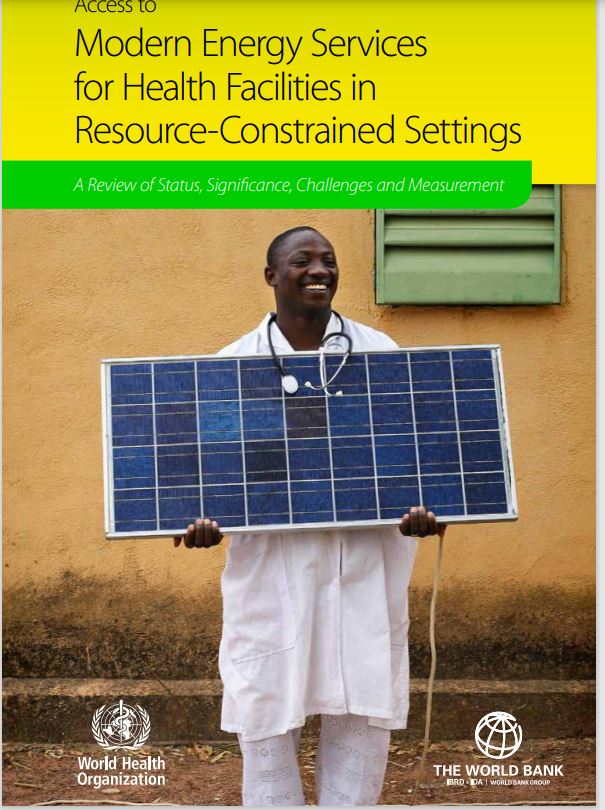Modern Energy Services for Health Facilities in Resource Constrained Settings
 |
A Review of Status, Significance, Challenges and Measurement
publication Jan 2014 ; 102 pages
Ed. OMS - Antananarivo OMS - Brazzaville OMS - Nouakchott OMS - Beirut
Downloadable format: PdF
Downloadable from the publisher
Abstract:
Universal health coverage and universal access to efficient modern energy services are both global developmentgoals. Rarely, however, have they been explored in tandem. This document sets out key issues, opportunities and synergies for further exploration. The report is intended to inform the Sustainable Energy for All (SE4All) initiative, which aims to achieve universal access to energy by 2030 as well as double the rate of improvement in energy efficiencies and the share of renewable energy in the global energy mix. This report is particularly relevant to SE4ALL’s new High-Impact Opportunity (HIO) on Energy for Women’s and Children’s Health, which aspires to improve availability and quality of essential maternal and child health care through the scale-up of energy access in health facilities. This report lays the groundwork for further work and consultations leading to: the development of tools for better assessment of the state of energy access in resource-constrained health facilities; design of interventions; and measurement and monitoring of progress. Although household energy access has been a focus of increasing attention, access to energy for health facilities has received much less emphasis. Health facilities are community institutions where access to adequate, reliable and sustainable energy is particularly important. Energy access is a critical enabler of access to medical technologies, and thus an important determinant of the effective delivery of essential health services. Without energy, many life-saving interventions simply cannot be undertaken. This poses barriers to the attainment of universal health coverage as well as to key health-related Millennium Development Goals (MDGs). Reliable data on energy access in health facilities is currently very sparse. WHO and other international and bilateral agencies support limited monitoring and measurement of energy access in health facilities in the context of facility infrastructure surveys. Some studies by the World Bank and other agencies have looked at indicators of health-sector energy access in community development contexts. But a better understanding of the multidimensional linkages between energy and health service delivery is needed. This report examines the energy needs of health facilities in resource-constrained settings most commonly found in low-income countries or emerging economies. The report considers available evidence about inadequate energy supplies’ impacts on health services as well as trends in the use of energy technologies. These are used to develop a rationale and approach for tracking and monitoring energy access in health facilities. This report’s findings are most relevant to clinics and health centres at the primary and secondary tiers of health systems, many of which struggle to access sufficient energy to power lighting, refrigeration and a few basic medical devices. Access to reliable electricity, however, is also a severe problem at higher levels of the health services chain, including large urban hospitals. While the energy needs of larger facilities are inevitably more complex, many of the messages and findings presented here are relevant for hospitals. The broader aim of this report is to support better measurement, monitoring and design of energy interventions that optimizes delivery of health services at all levels.
Target Audiences:
Association , All public , University , Teacher , Adult , Facilitator / Educator , Cooperation actors , Technician , Engineer, designer , Migrant , Socio-Economist , Local and national decision makers , Health professionals
Keywords: |
access to electricity (CI) (DT) (ET) , access to energy (CI) (DT) (ET) , community health centre (CI) (DT) (ET) , disability (CI) (DT) (ET) , electrical energy (CI) (DT) (ET) , electrification (CI) (DT) (ET) , energy (CI) (DT) (ET) , health (CI) (DT) (ET) , human Development (CI) (DT) (ET) , rural (CI) (DT) (ET) , rural development (CI) (DT) (ET) , sanitation bloc (CI) (DT) (ET) , solar energy (CI) (DT) (ET) |
Publishers/Broadcasters: |
|
OMS
-
Organisation Mondiale de la Santé - Brazzaville - Congo |
OMS
-
Organisation Mondiale de la Santé - Beirut - Lebanon |
OMS
-
Organisation Mondiale de la Santé - Antananarivo - Madagascar |
OMS
-
Organisation Mondiale de la Santé - Nouakchott - Mauritania |
If there is a broken link, we will be pleased to receive a message: communication@pseau.org